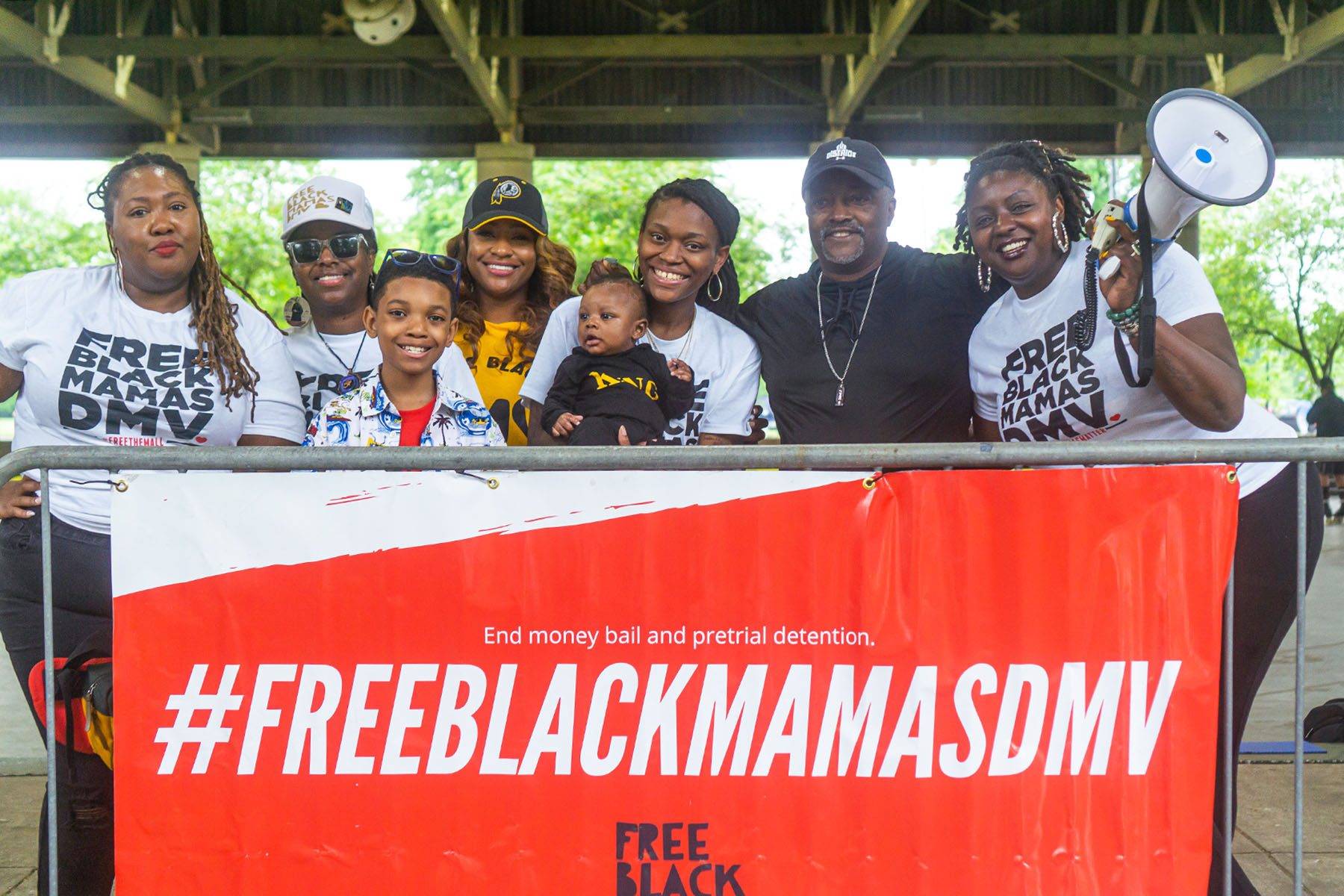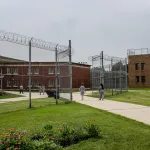We’re telling the untold stories of women, women of color and LGBTQ+ people. Sign up for our daily newsletter.
WASHINGTON, D.C. — At the Anacostia roller skate park in Washington, D.C., Lakeasha Coley cradled her baby grandson against her chest while watching her 24-year-old daughter, Leara Davis, jump double dutch on a chalk-covered sidewalk.
Coley cheered as Davis laughed while hopping over the ropes, her long locs bouncing around her white T-shirt with bold black letters on the front that read “Free Black Mamas.”
Despite the picturesque day, Davis had an unsettling feeling that the moment was just a dream she could soon wake up from. Twenty days earlier, Davis had been released from jail, where she’d spent about four months — the first four months of her son’s life.
“I felt like I was gonna wake up and be back in my cell,” Davis told The 19th. “I had dreams like that while I was locked away, and I woke up and realized I was still in that same box of a room. So to be actually awake, and holding my son and experiencing the good music, and good vibes, and the people and the ice cream — it was awesome.”
She was released on April 17 as a result of advocacy by the Free Black Mamas DMV campaign, a multi-group effort to get Black mothers and caregivers out of jails in the Washington, D.C., Maryland and Virginia area leading up to Mother’s Day. At the skate park, Davis and her mother gathered for a community fundraiser and celebration of Black joy alongside organizers, volunteers and other mothers supported by the campaign.
Organizers JeNae Taylor, Nnennaya Amuchie and Samantha Master started Free Black Mamas DMV in 2017 as a self-described Black women and femme-run abolitionist campaign seeking to end the country’s current carceral system. Since that time, the group has helped more than 65 people return home from jail. The effort is part of the National Bail Out, a collective of local and national Black-led organizations that plan Mama’s Day Bail Out events around the country.
In the Washington, D.C., area, the groups leading the bail out campaign include Life After Release, Out for Justice and Harriet’s Wildest Dreams. While they address criminal legal issues more broadly, their work also provides services specifically aimed at supporting affected women and LGBTQ+ people.
For the bail out campaign, they monitor court proceedings and work with lawyers to identify people like Davis in need of release from jail; they also plan community events to help raise money and public awareness about racism and discrimination within the legal system.
“The work that we do is oppressive. The work that we do is traumatizing, and so in everything that we do, we try to find joy, and we try to bring joy to the community,” said Qiana Johnson, the founder of Life After Release, one of the groups behind Free Black Mamas DMV. “It’s a community that is hurting and a community that needs as much love, joy and support as they can get.”
About 45 percent of incarcerated women are held in local jails around the country, according to a recent report by the nonprofit think tank Prison Policy Initiative. Sixty percent of these women have not yet been convicted of a crime and about 80 percent of them are mothers. Data on the number of LGBTQ+ people in jails is lacking, but a large proportion of queer-indentifying incarcerated people are women, according to the Prison Policy Initiative report.
Though the incarceration rate of Black women has declined over the last two decades, the imprisonment rate for Black women in 2021 was 1.6 times higher than the rate for White women, according to the nonprofit research and advocacy center The Sentencing Project. The most recent jail population report from the Bureau of Justice Statistics does not disaggregate women in jails by race, but highlights the general overrepresentation of Black people in jails.
Black women are also more likely than other groups of women to be heads of their household, which means their incarceration has lasting effects for their families.
When a person is arrested and charged, but not convicted, a judge determines whether they are released pre-trial “on recognizance,” meaning they are not required to pay anything with the promise that they will return for all court appearances. A person can also be released with non-monetary conditions like electronic monitoring or court check-ins. In other cases, judges can impose monetary payments for pretrial release, which is typically 10 percent of the total bail.
Bail can range from a couple hundred dollars to tens of thousands of dollars, based on factors like the severity of the crime, past criminal history and flight risk. However, research indicates that bail judges of different races show bias against Black criminal defendants, which results in fewer non-monetary alternatives for pretrial release and higher bail payment amounts.
“There is kind of this mythology about people leaving and running off to some country or something when they’re facing charges,” said Gina Clayton-Johnson, executive director and founder of the Essie Justice Group, an organization that works with women who have incarcerated loved ones. “That’s not actually what is happening. But what is happening is that low-income folks, and particularly Black people, Brown people, low-income folks, are being caged pretrial.”
-
The latest from The 19th
- Many AAPI people still feel unwelcome or unsafe, new surveys show
- Caregiving costs women nearly $300,000 in lost pay over their lifetimes, Department of Labor finds
- An abortion pill distributor reportedly won’t supply the drug to pharmacies in 31 states. House Democrats want answers.
Clayton-Johnson noted that a woman her organization bailed out days ago had been arrested for sleeping in her car and was held in jail for two months without a conviction because she could not pay her bail.
“Right now that is our approach to homelessness, to mental health disability, all kinds of issues that we know how to address. But right now our approach is with a cell,” she continued.
In recent years, a number of states have moved to reform money bail practices. This year Illinois was set to become the first state to eliminate the use of cash bail, but the policy is on hold as the state supreme court evaluates legal challenges to the law. In Maryland where Free Black Mamas DMV operates, a recent attempt to move away from money bail involves shifting to the use of artificial intelligence to assess the potential risk of a pretrial defendant committing new offenses.
But organizers with Free Black Mamas DMV said this risk assessment tool continues to perpetuate racial biases and has led to more people being held without bond, which makes their advocacy work more complicated and time consuming.
Beyond concerns about bail, incarcerated women also face a range of health issues while inside and disproportionate financial challenges after release, such as securing employment whether they were convicted or not.
Women in jails and prisons “have a higher rate of what we call ‘economic marginalization,’ so they’re more likely to not have a high school education or GED, they’re more likely to either be unemployed or come from part-time employment prior to incarceration. They’re more likely to be primary caregivers of children under the age of 18. These factors are still present when they are released,” Alesa Liles, an associate professor of criminal justice at Georgia College & State University, previously told The 19th.
When it comes to health, women are more likely than men to enter jail with chronic diseases, substance use issues, mental illnesses and experiences with physical or sexual abuse, experts previously told The 19th. For pregnant women like Davis, their health needs can be even more dire.
When Davis entered jail in December, she was eight months into a high-risk pregnancy. She delivered her son through an emergency C-section while incarcerated at 1:08 p.m. on December 18. By 10 a.m. the next day, child protective services had taken him to live with her family.
“It made me feel broken,” Davis said. “I’ve never felt pain like that before, and I think I’ve been through it a lot in my short 24 years.”
The day Davis was released from jail, she felt like a celebrity: She was greeted with welcome signs, baby clothes and other essentials.
The organizations at the center of the Free Black Mamas DMV campaign recognize that bail and pretrial detention is one aspect of the criminal legal system that affects people’s day-to-day lives. Providing support services that address a range of needs is key to their work, Johnson of Life After Release said.
For pretrial advocacy, Life After Release and Harriet’s Wildest Dreams help with court watching, which allows community members to observe and document proceedings for accountability. Participatory defense is another practice they use based on a community model to train the loved ones of those charged with crimes to be actively involved in their criminal defense process.
Following incarceration, Life After Release has an eight-week Justice and Liberation Institute that seeks to empower formerly incarcerated people and their families to navigate the criminal legal system. In addition to this, Johnson said they address individual needs as they come.
“That could look like housing assistance, transportation assistance — helping them get their car fixed, helping them move or get a bed for their children, or helping them get groceries. We’re a community,” Johnson said.
Now that Davis is out of jail and back with her family, she said she has a lot of aspirations for the future and hopes to go into the health care field. But for now, she is cherishing her time with her son and enjoying being a new mom.
She does not have specific plans for Mother’s Day, she said. “I’m just going to stare at my son,” Davis said with a laugh. “I just look forward to hanging out with him. I’m going to show him all the Disney movies that I grew up loving.”







